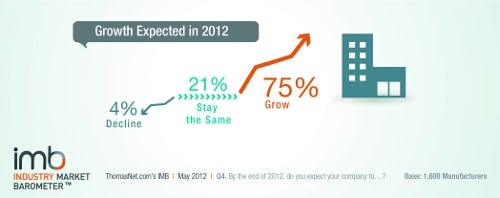March 11, 2015
There's a flurry of activity on the shop floor at Marketing Masters, Inc., in Issaquah, WA, where they are finishing up the installation of a new molding machine. The company, which manufactures clip nuts, self-locking fasteners and high-tech inserts, has also hired two new workers. These investments are both necessary—to keep up with a slew of new orders; and strategic—having increased its sales 30 percent last year, the company is looking to secure a continuing ability to grow.
It appears that Marketing Masters is not alone. The findings of ThomasNet.com's fifth IMB (Industrial Market Barometer) reveal that Marketing Masters' experience is one shared by a majority of American manufacturers, who are achieving real sales growth. The survey finds that more than half of these companies (53 percent) grew in 2011, and 75 percent expect to grow this year.

ThomasNet.com IMB US mfg chart
Buoyed by growth and confident in their futures, American manufacturers are laying out an agenda for restoring their industry to its earlier glory. Overwhelmingly, they are pushing to revitalize the American manufacturing sector by creating jobs at home, doing business with U.S. suppliers and expressing pride in the quality of products that are "Made in America."
Companies investing and hiring; need more skilled labor
This level of growth is igniting a new wave of investments among manufacturers preparing to meet future demand. They are spending on capital equipment, hardware, software and facilities to increase production capacity (83 percent), upgrading their plants, and developing new products/services.
In addition, nearly half of these manufacturers (48 percent) are hiring, with openings for line workers, skilled trade workers, and engineers. But for many manufacturers, finding the best people to fill these new positions is far from assured. Respondents to ThomasNet.com's IMB lament the skilled labor shortage, and are vocal about what needs to be done to fill the gap. One noted that we need to "improve the attitude within the U.S. regarding the desirability of manufacturing for the next generation." And many respondents want to see education reform with the aim of giving America's youth the skills needed to join the manufacturing workforce.
Standing behind "Made in America"
In addition to the skilled labor shortage, manufacturers point to pricing pressures and overseas competition as challenges to growth. China's ability to pay lower wages and charge less for products is a thorn in the side of many. In response, U.S. manufacturing companies are capitalizing on the meaning of the "Made in America" brand.
"When our clients began to show interest in outsourcing to China, we began an international marketing and branding campaign to bring them back," says Kevin McGrath, vp of sales and marketing, The Rodon Group in Hatfield, PA, one of the largest family-owned and operated injection molders in the U.S., and a member of American Made Matters. "Our customers have seen that off-shoring increases the risk of poor quality control. By maintaining the quality inherent to U.S. products, and keeping our prices competitive with China's, we continue to expand."
Respondents to ThomasNet.com's IMB are also capitalizing on America's reputation for quality by ramping up their exports. Nearly seven out of 10 (67 percent) are selling overseas, and more than one-third of them (37 percent) plan to increase their international sales.
Online marketing helps reach new customers
To reach new customers, overseas and at home, nearly nine out of 10 product and custom manufacturers (86 percent) are investing in online marketing this year, and more than half (53 percent) are increasing these investments. They report that their websites have helped them find new sources of business, improve customer service, and increase revenues.
"Our website has become our number one prospecting tool," says Zach Arnold, president, Arnold Machine, Tiffin, OH, which makes custom equipment to automate the manufacturing process. "Not only have we expanded our footprint; we're landing more profitable jobs."
Win or lose—choosing manufacturing all over again
With successes like these, manufacturer respondents are bullish on both the future potential of their industry segments—and their own careers.
Regardless of either the past or predicted performance of respondents' companies, just under 90 percent report optimism about future growth in their market sectors. And, nearly eight out of 10 would "do it all over again" if they were just starting out. They want younger generations to appreciate manufacturing, too. One respondent notes: "There is a need for excitement to be found in creating something tangible, from engineering and design to the finished product."
"Manufacturers know that they do more than sell products or provide services; they play a vital role in the growth of the American economy," says Eileen Markowitz, president, Thomas Industrial Network. "Their success is critical to the success of America. And as we can see from this report, the future is looking bright for all of us."
Read the detailed survey results here.
Source: ThomasNet.com
.
About the Author(s)
You May Also Like


